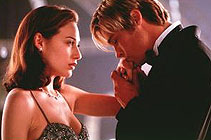|
|
|
|
Meet
Joe Black
|
 |
|
In the three-hour long Titanic (1997), it took James Cameron two hours to get to the point where the ship tipped everyone overboard. In Meet Joe Black, also three-hours long, the characters seem to be underwater from the word go. I have not seen an American film so excessively, unfathomably slow and glacial since Regarding Henry (1991). The serene, ghostly way that characters move through doors, rooms, behind windows; the manner in which quizzical bits of comedy are stretched out like a piece of performance art; the perpetually stunned look on everyone's faces, as if they were recovering from a recent drug episode ... What on earth is going on in Hollywood's latest attempt at a mystical love story in the vein of Ghost (1990)? The leaden pace and the relentlessly luminous lighting are doubtless the signs by which director Martin Brest (Scent of a Woman, 1992) wishes to inform us of the seriousness of his intentions. But this elaborate remake of Death Takes a Holiday (1934) is a bizarre and muddled exercise. Its fuzziness (visual as well as conceptual) almost obliterates the inherent fascination and tear-jerking potential of the material. Media tycoon William Parrish (Anthony Hopkins) is nearing his sixty-fifth birthday. Feeling the first tugs of mortality, he starts philosophising endlessly about what a full, great life he has led – which is probably easy to say when you're as rich, pampered and protected as this guy is. But, one evening, the incarnation of Death – expediently re-named Joe Black (Brad Pitt) – shows up. He delays taking William away to the next world because, like Bruno Ganz in Wings of Desire (1987), he is keen to experience all earthly sensations. Does Joe know about life on earth or not? This is only the first of many logical queries that nag at the viewer of Meet Joe Black. Joe starts out like the alien played by Jeff Bridges in Starman (1984) – an uncoordinated, innocent child, unmannered and wide-eyed. But almost instantly he transforms into a wonky clone of Cary Grant (supposedly sweet, disarming, seductive, urbane) – thus winning the fluttery heart of William's daughter Susan (Claire Forlani), who first encountered Joe's body when it housed a normal, average human being. Here is the second of the film's logical problems. What kind of unintentionally perverse love story is this? Susan – saddled with the typical movie problem of a dreary fiancé – falls head over heels for the sensitive, plain-talking, romantic 'Joe' she meets in a cafe. Then, without the slightest doubt or hesitation, she instantly transfers this love to a goofball with a completely different personality. The only possible explanation for her behaviour is Brad's good looks – and the film wastes no opportunity to remind us (in words and images) just how beautiful he is meant to be. Watching the film try to squirm out of the complications created by this queer premise is a spectacle in itself. But there is more. Why is a movie that trades so shamelessly on pop mysticism willing to personalise Death while refusing to utter the dreaded G-word: God? Why doesn't Death practice safe sex? And the ending (which will remain undisclosed here) creates far more confusion than it resolves. Some movies are beyond labels of good or bad; they are so strange, they demand to be experienced and mused over. Meet Joe Black – named MJB in the press kit, doubtless to give it the hip allure of MIB (Men in Black, 1997) – is one such oddity. Some of the more earthly aspects of the story – especially the fraught relation between William and Susan – work very effectively on an audience's emotions. But Brest's ambitions are located elsewhere: in all the tortuous, sub-Carl Dreyer moments when characters realise a profound truth or 'touch the absolute'. Such zany highpoints simply have to be seen to be disbelieved. © Adrian Martin March 1999 |
![]()